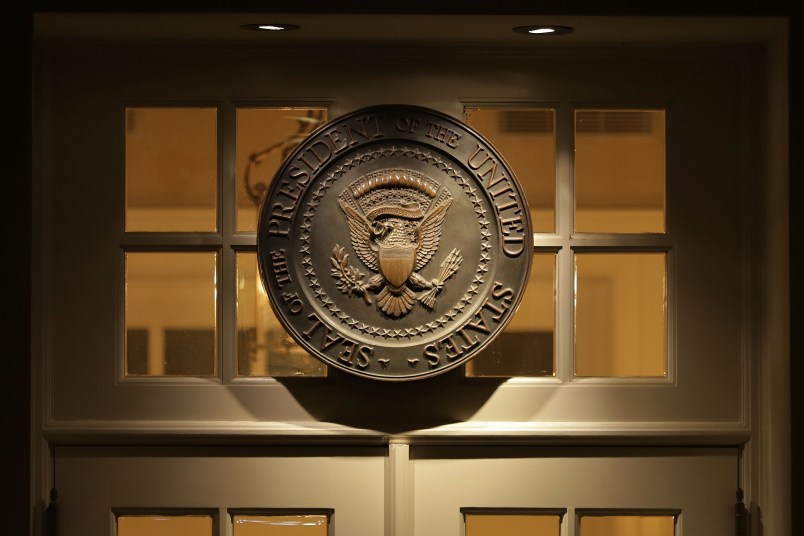In a scandal whose reach is getting wider and wider, the role that a top White House lawyer played in the events surrounding President Trump’s Ukraine pressure campaign stands to be a key focus of the impeachment investigation.
John Eisenberg — a deputy White House counsel who serves as legal counsel to National Security Council — keeps popping up with growing prominence, as Congress seeks to understand the full extent of Trump’s push for a Ukraine smear campaign against his political rivals.
There are many questions about how he handled the initial allegations of an inappropriate pressure campaign — and why he sought to restrict access to a phone call record where Trump spoke explicitly about his demands. Was Eisenberg a careful lawyer being extremely careful or was he complicit in trying to conceal the President’s conduct? Or something in between?
Experts in the inner workings of the White House’s national security apparatus tell TPM that Eisenberg’s legal exposure is potentially significant, even if he was put in almost impossible situation of fielding claims of presidential misconduct that White House’s legal system is not designed to handle.
“He needs to lawyer up,” said a former official with NSC experience, who did not work with Eisenberg. “He has gotten himself involved way too much.”
A spokesman for the NSC did not respond to TPM’s inquiries about Eisenberg reported actions.
Eisenberg’s position in the White House counsel’s office made him the go-to person when legal questions arose about some of the more dubious operations coming out of the White House — including the Ukraine saga, but also previous controversies, like former National Security Advisor Michael Flynn’s false claims about his Russian contacts and a Middle East nuclear power project Flynn was pushing.
In a typical administration, the NSC legal counsel would advise on whether a President’s national security initiatives could fun afoul of the law. He or she would also be expected to step in if a rogue administration actor was undercutting U.S. foreign policy.
But when that rogue actor is the President, it makes Eisenberg’s options for dealing with alleged misconduct much more limited, according to Timothy Edgar, an Obama NSC staffer who also worked in the George W. Bush administration.
“The thing that makes it difficult is that what normally would happen with someone going off on their own is that they would get fired,” Edgar said. “When it’s the President, that doesn’t work.”
Eisenberg was made aware of the gambit to persuade Ukraine to open investigations political beneficial to the President weeks before Trump’s fateful call with Ukraine President Volodymyr Zelensky. On the July 25 call, Trump requested Zelensky open a probe into Joe Biden and into a conspiracy theory about the origins of the Russian election meddling investigation.
On at least two occasions before the call, former NSC staffer Fiona Hill raised the alarm to Eisenberg about the “drug deal” — in the reported words of her boss, National Security Advisor John Bolton — that was being cooked up, according to reports of her congressional testimony.
Several other NSC officials also brought the issue to Eisenberg’s attention before and after Trump’s Zelensky call, the Washington Post reported.
According to Edgar, it’s no surprise concerned officials turned to Eisenberg.
“I can see why somebody would go to John Eisenberg,” Edgar said. “But I have a hard time understanding what you would do if you’re John Eisenberg.”
Edgar said perhaps Eisenberg’s only option was to threaten to resign and to hopefully get other top officials to threaten resignations with him. But what Eisenberg did instead was a major allegation in the whistleblower complaint that blew open the Ukraine scandal.
Eisenberg reportedly ordered the transfer of the White House’s record of Trump’s Zelensky call to a code-word protected system usually reserved for the most sensitive of operations. The whistleblower complaint suggested the move to “lock down” access to call was a sign that White House lawyers knew how grave Trump’s comments on the call were.
According to some reports, Eisenberg ordered the transfer of the call record out of concern that it could be leaked. The move came after the top lawyer for the CIA informed Eisenberg that a whistleblower through a colleague had alerted her to the call.
Democrats on the committees leading the impeachment probe told TPM they were interested in hearing from Eisenberg. But there are no formal plans yet to interview him and it’s unclear whether any demand that he testify could overcome the various privileges the administration could invoke.
Sources who spoke to Politico about Eisenberg described him as a very careful lawyer who was hyper-aware of potential leaks and the flow of information.
His former NSC colleagues told Politico said he was “extremely paranoid” and “incredibly conscious of trying to restrict conversations to only those that he really, really, really felt needed to know.”
Prior to joining the White House at the beginning of the administration, Eisenberg worked for Kirkland and Ellis, a private law firm with Trump administration ties, and before, that the Justice Department.
John Gans, the author of “White House Warriors: How the National Security Council Transformed the American Way of War,” noted the irony of Eisenberg’s current circumstances. Eisenberg is now in the middle of a scandal that has parallels to the Iran-Contra controversy, the Reagan administration covert arms-for-hostages operation that led to the creation of the NSC role Eisenberg now occupies.
“His office is the direct result of the last big misguided foreign policy operation run out of the White House,” Gans told TPM.



